Hello LSC.
At the end of each season, we like to take some time to recap the efforts of the Lake St. Catherine Association (LSCA) and our partners during the year. This work is performed on behalf of the lake community and our membership as we endeavor to fulfill our mission of the preservation, protection, and maintenance of Lake St. Catherine.
What you’ll read below are short summaries of the projects and activities from 2023, but we encourage you to visit our website and click on our Blog to read more detailed accounts of all these efforts.
We’ve got a lot to tell you about, so please get comfortable, grab a hot cider, and read on for our 2023 Year In Review.
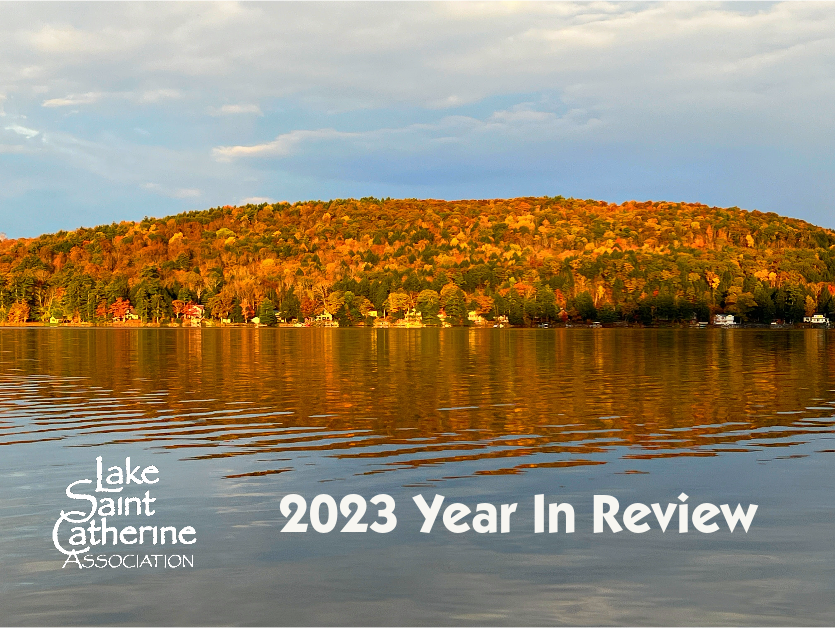
Membership
Thank you to everyone who contributed to the LSCA this year through memberships and donations! Your contributions are critically important to help fund our numerous lake management programs which you’ll read more about below.
Our membership continues to grow - which shows that we have a great community of lake stewards who are invested in preserving, protecting, and maintaining beautiful Lake St. Catherine. As of this writing, we have 395 members who contributed a total of $77,791, giving us an average contribution of $203. While we did receive just slightly less than last year, we did surpass our 2022 total for active members.
Can we crack the 400 member mark next year? This will again be our goal as we continue to reach out to LSC property owners, and hope to expand our reach with membership levels for family members of property owners, renters, and those who use the lake for recreation.
We’d also like to thank camp owner Andrew Gioulis for his fantastic design of our 2023 Membership gift, this beautiful 3" x 3" iron-on patch depicting a loon scene from Lake St. Catherine. With this new patch, we are looking to start a bit of a new tradition in which members can collect these patches each year to display, or iron-on or sew onto a hat, shirt, bag, etc. We’ve just started working on the patch design for 2024.
We hope to earn your support next year as we launch our Membership Drive in early February of 2024.
Thank you for your support!
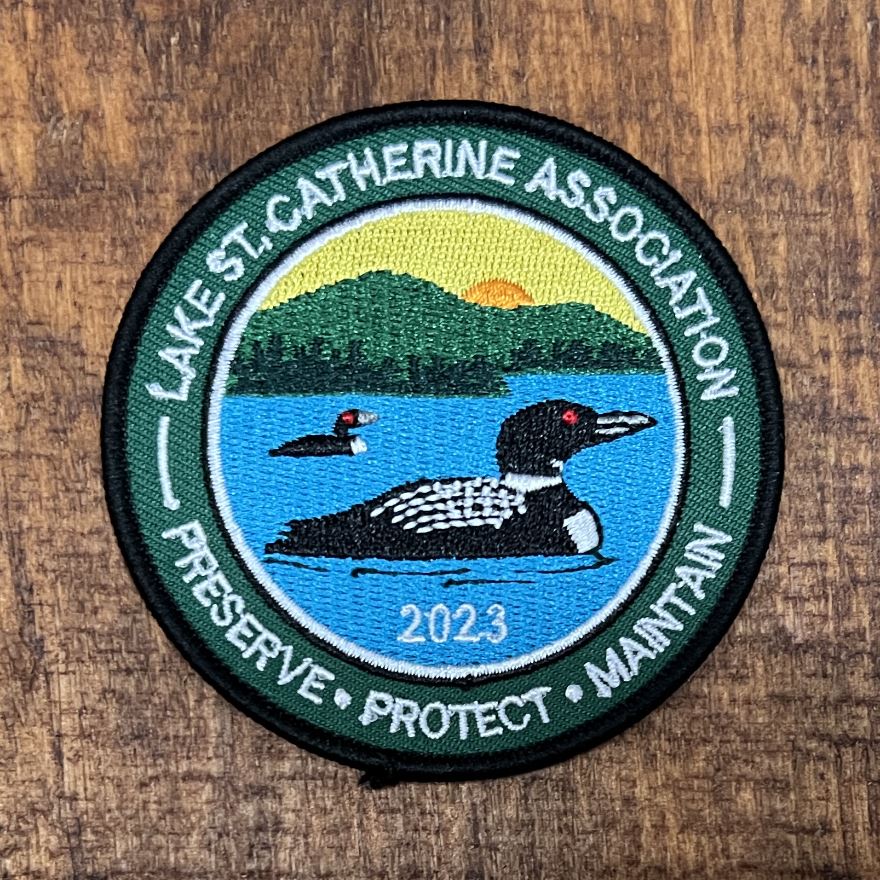
Volunteering Around Lake St. Catherine
We’d like to thank all of the volunteers that participated in the various lake related activities this season! Here is a quick summary of a few of the volunteer opportunities around Lake St. Catherine this year.
Green Up Vermont Day: Green Up Vermont Day is a state-wide volunteer cleanup day of Vermont's roads and waterways which takes place on the first Saturday in May. As Green Up Vermont's website says: "We know it isn’t your litter but Vermont needs our help to be beautiful!". Building on the success of our 2021 and 2022 efforts, we were able to organize volunteers to cover almost all the roads around Lake St. Catherine! On the morning of Green Up Day, volunteers met at the Wells Lakeside Park to kickoff the day with coffee and muffins from the Wells Country Store, thanks to the Town of Wells. Volunteers picked up Green Up Day trash bags, fueled up, and headed out to get to work. By the end of the day, the roads around the lake were cleaned up, and lined with filled Green Up Vermont trash bags. Thank you to the town crews from Wells and Poultney for picking up the bags. We’ll do it again in May!
Milfoil Cleanup Community Day: In early June, as part of our milfoil control efforts, the LSCA hosted a meeting at the Wells Lakeside Park on Little Lake. We discussed what Eurasian Watermilfoil (milfoil) is, what it does when introduced into a lake, and why we work to control it in Lake St. Catherine. We then outlined the milfoil control plans for the year, and we talked about what you can do to help to Stop The Spread of Milfoil in Lake St. Catherine. Because of the poor weather that day, we did not head out onto the lake for our usual cleanup day. However, throughout the rest of the season, volunteers placed detached milfoil and other plants on the designated float in the Channel, and we made numerous collection runs to remove the plants. Thank you to all the volunteers involved in this project! We’ll do it all again next year.
Also, in late August, the first Vermont Invasive Patroller (VIP) paddle was performed on Lake St. Catherine. Volunteers gathered at the boat launch in Wells, and performed a VIP paddle looking for aquatic invasive species. We’ll go into more detail on the VIP program at Lake St. Catherine a little later.
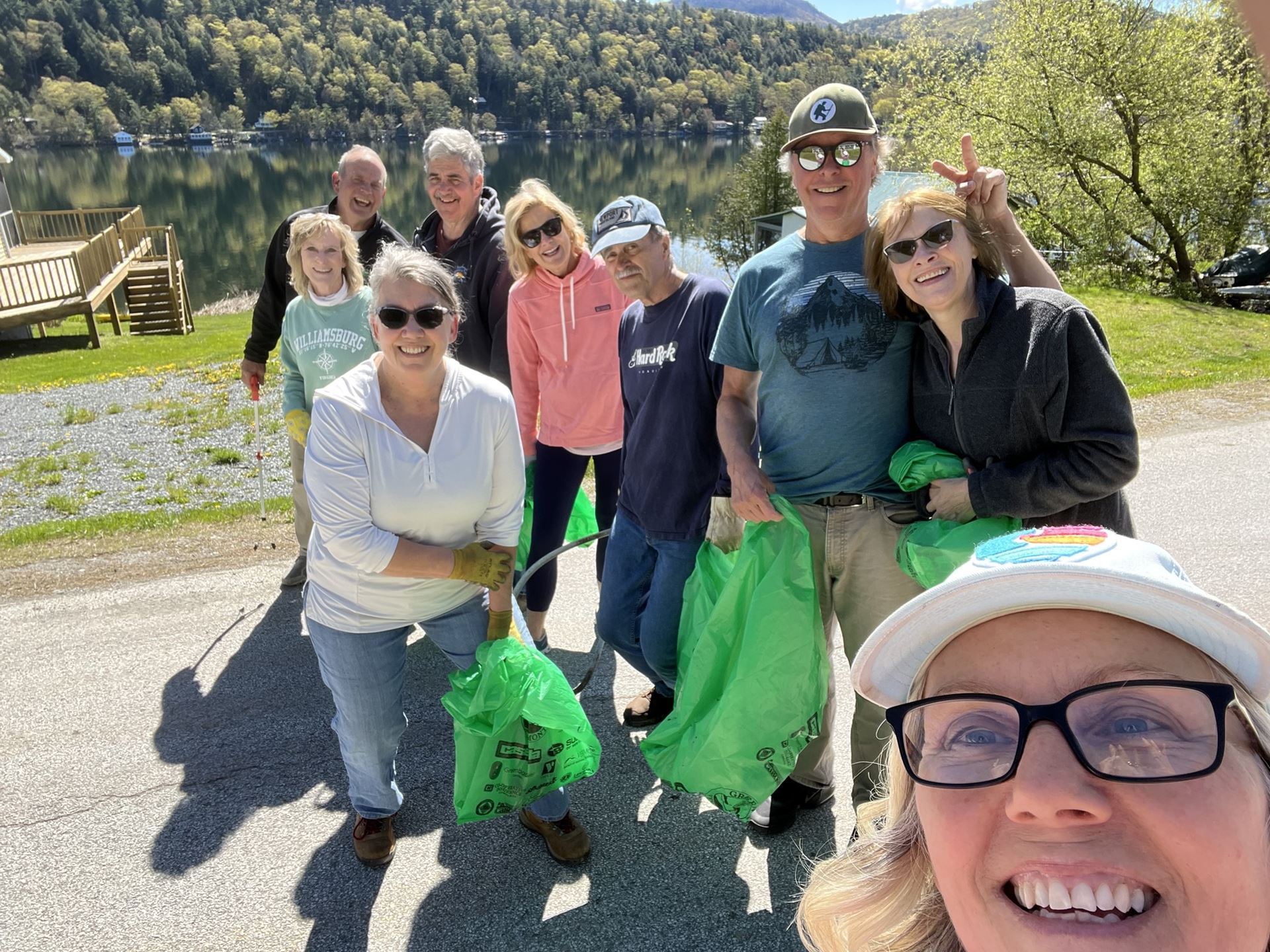
Lake St. Catherine Watershed Action Plan
In May of 2021, the LSCA earned a grant from the LCBP to help fund the creation of a Lake Watershed Action Plan (LWAP) for Lake St. Catherine.
From the Environmental Protection Agency (EPA), a Lake Watershed Action Plan is described as:
“Watershed planning helps address water quality problems in a holistic manner by fully assessing the potential contributing causes and sources of pollution, then prioritizing restoration and protection strategies to address these problems.”
In partnership with the PMNRCD, the LSCA will use this 3-year grant to create an LWAP for Lake St. Catherine. The $38,224 awarded by the grant will allow the LSCA to hire and partner with lake experts to perform various in-lake and watershed based measurements, testing, and studies to identify current or potential future issues and design a comprehensive, long-term plan to address them. The resulting plan will leverage current LSCA investments in water quality and pollution prevention, be driven by accepted best management practices, elevate under-assessed areas and gaps, and will identify issues, opportunities, and projects to guide locally-led water quality implementation work in the Lake St. Catherine watershed.
After many years of successfully managing individual lake programs which include: in-lake invasive species control (Milfoil Control Program), invasive species prevention (Greeter Program, VIP Program), and stormwater management (Lake Wise, SWMP), the LSCA is now poised to integrate these programs into a broader watershed plan with a focus on the prevention of pollutant loads (phosphorus, nitrogen, sediments) that enter into the Lake from sources outside the waterbody. The LSCA plans to use the success of these building blocks to expand its work in the watershed and focus on prevention for the future.
A Project Team led by Trustees of the Association will engage the following partners:
-
Poultney Mettowee Natural Resources Conservation District
-
The Natural Sciences Department at Castleton University
-
Fitzgerald Environmental
-
Limnologist Emily Porter-Goff PhD from the Lamoille County Conservation District
-
Lake community Stakeholders
Subsequent grants will be requested to implement as many projects as possible and create a culture worthy of emulation that positions Lake St. Catherine for future funding that rewards water quality improvements including phosphorus load reduction. These efforts will continue for the balance of the decade and be the most important contribution all those who love being at Lake St. Catherine can do to distinguish its future beauty and health.
Field work began in May, and will include assessment of current conditions in areas to include: in-lake, shoreline, roads & culverts, tributaries, wetlands, and forested land. The team will also evaluate and consider the characteristics and special needs of unique areas of the Lake like in our bays and channels - and everything in-between, from the Lily Pond, through the Big Lake & Little Lake, to Lake's End. The result will be a long-term lake management plan for Lake St. Catherine.
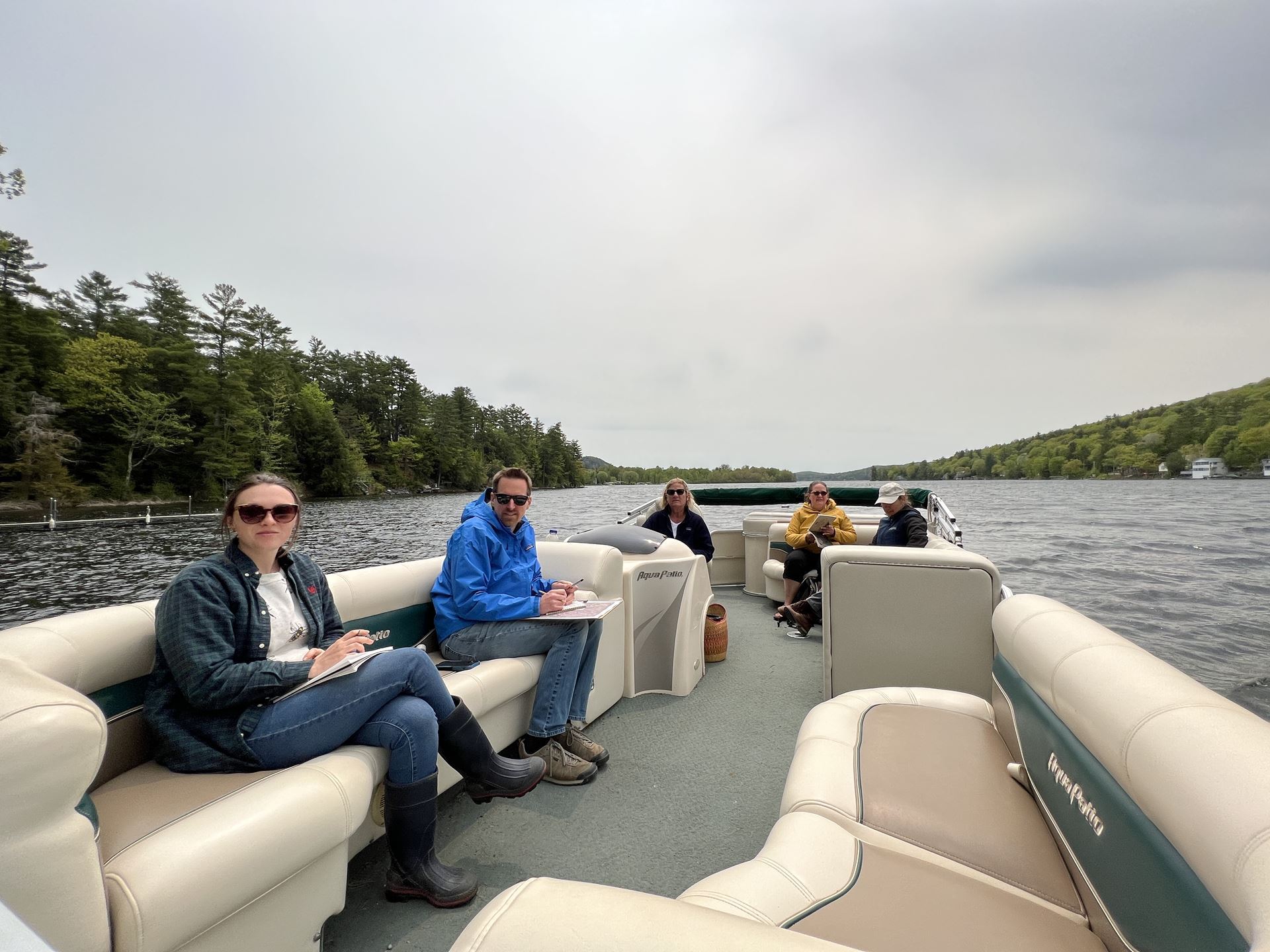
Presentation At Wells Village School
We'd like to thank the Wells Village School and Ms. Woodruff for inviting us to speak and give a presentation to the 6th grade class in early May as part of their Career Explorations day.
The students all had GREAT questions as we discussed conservation & protection of the lake, and how volunteerism plays a big part in that process.
Students also heard from Rutland District Senator Brian Collamore about his previous radio career, and his current work in the legislature.
Thanks again to the School and to the students who made it a great morning with their enthusiasm and attention!
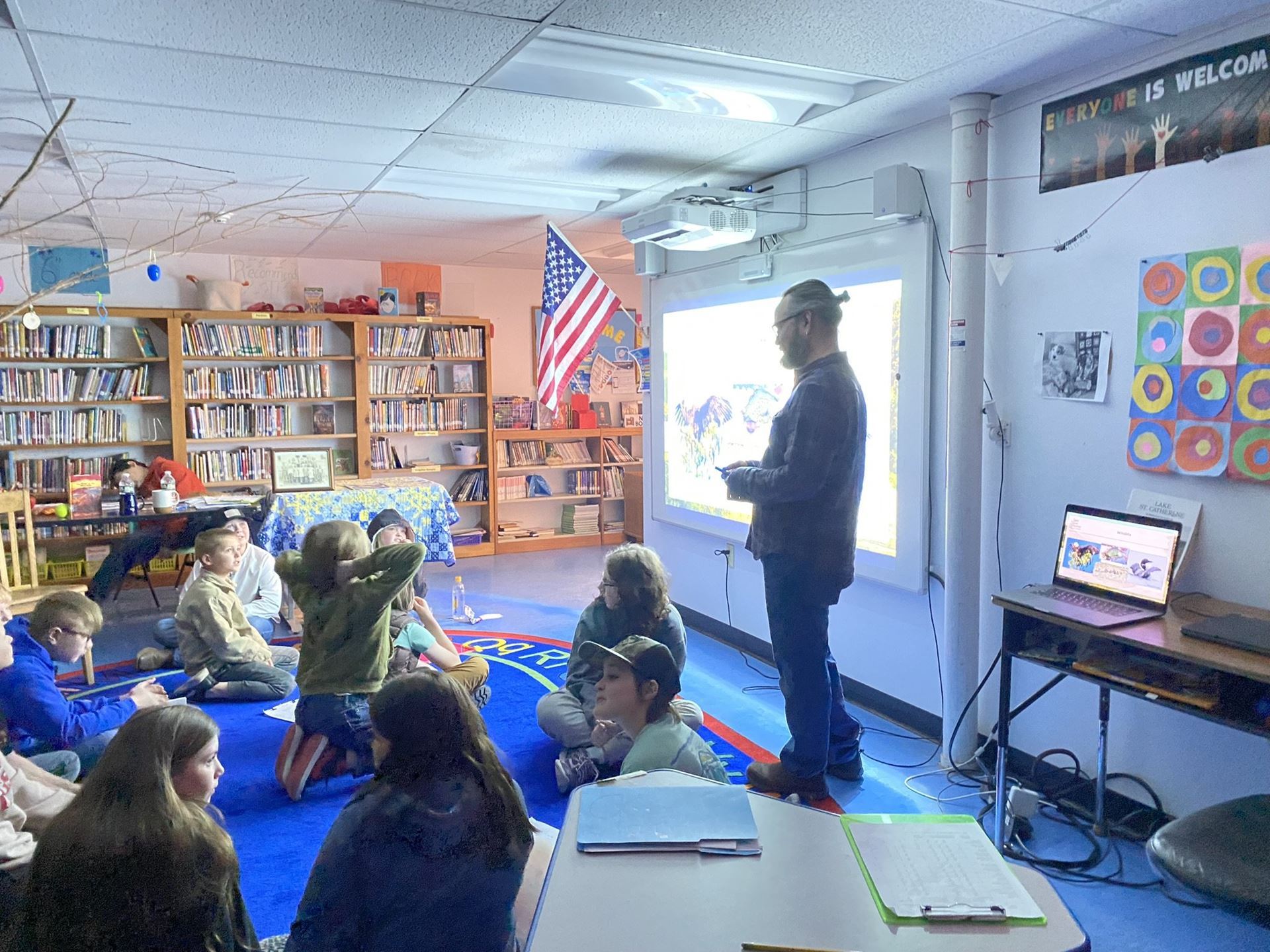
Lay Monitoring - Water Testing
The LSCA has participated in the Vermont DEC's Lay Monitoring Program since its inception, and has assisted in collecting almost 40 years of water data on LSC. LSCA Trustees collect bi-weekly water samples from Big Lake and Little Lake from Memorial Day to Labor Day each season which are sent to the DEC for testing. The water is tested for phosphorus, clarity (secchi depth), chlorophyll-a (algae), and as of this year, caffeine. You can review the data from the Big Lake (since 1979) and Little Lake (since 2009) by visiting the Lay Monitoring Lake Water Quality Data website. When on this page, select 'Wells' from the 'Select Town' dropdown, and Big Lake and Little Lake data will be available to view.
Greeter Program - Boat Launch Monitoring
Our Greeter Program is very important to the health of Lake St. Catherine. Our Greeters have been trained to identify aquatic invasive species (AIS) - like spiny waterflea, asian clams, water chestnut, starry stonewort and zebra mussels - to stop them from entering LSC at the boat launch in Wells and the State Park in Poultney. They also educate boaters about the importance of looking for these invasives on their boat or trailer so they are not spread to LSC or another lake. Each year, they do a fantastic job checking vessels and educating the lake community on the dangers of invasive species for Lake St. Catherine. They are on duty from Memorial Day through Labor Day - working on Friday, Saturday and Sunday. They also cover holidays and fishing tournaments.
In total, our Greeters inspected 1,149 boats this year at the boat launch in Wells, and at the State Park in Poultney. This is around 800 less than the number of vessels they inspected last year. Boat launches were down in 2023, most likely due to numerous rainy weekends this season.
Our Greeter Program is partially funded by a grant from the Vermont DEC, a grant from the LCBP and contributions from our membership.
Thank you to our Greeter team! They work hard each season to keep AIS out of Lake St. Catherine.
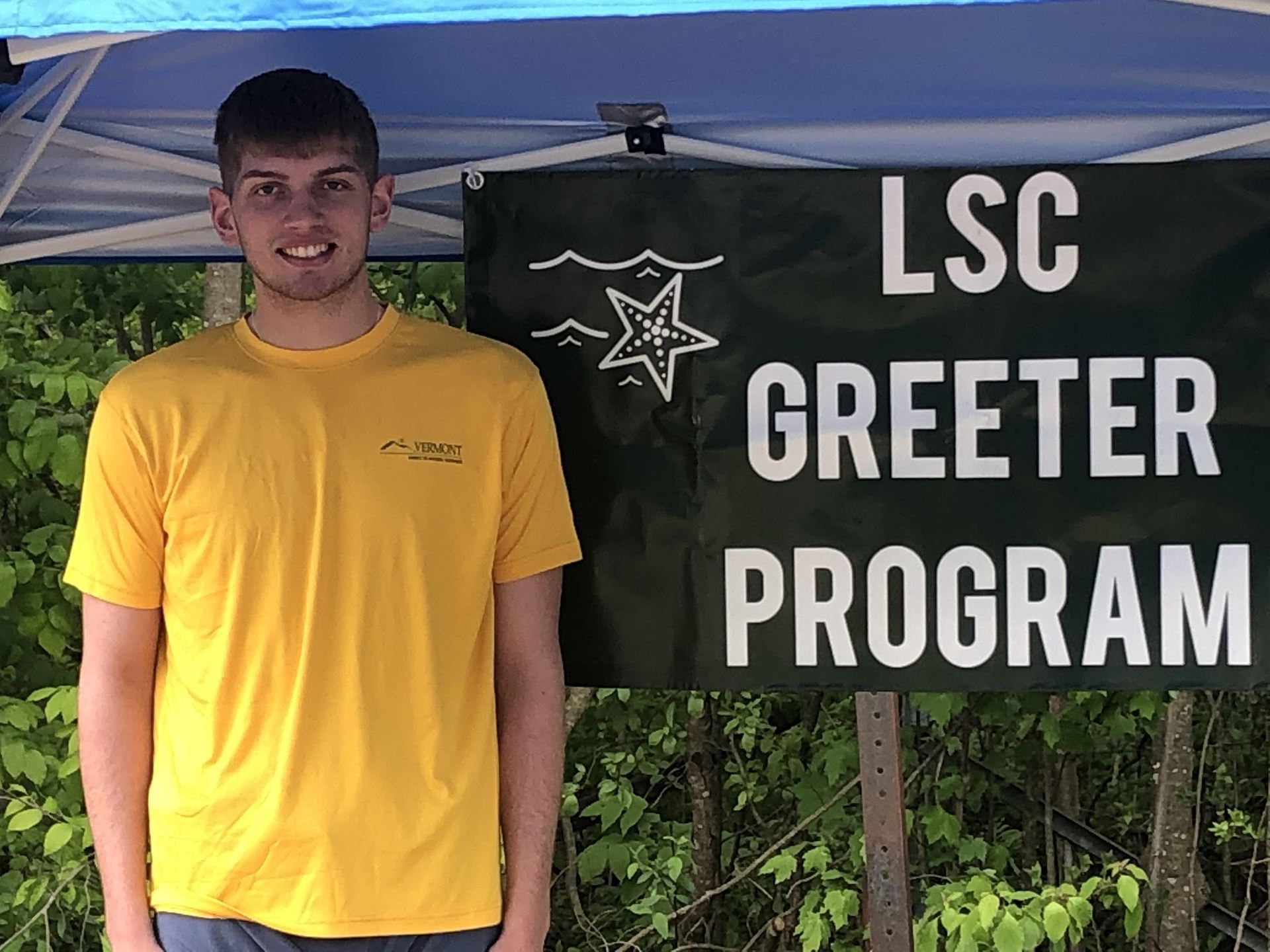
Lake St. Catherine’s Eagles Have Three Eaglets!
Lake St. Catherine’s nesting pair of eagles had three eaglets in April! Over the course of the past several years, they have parented multiple groups of eaglets, so it was great to see babies in the nest again after they did not have any in 2022.
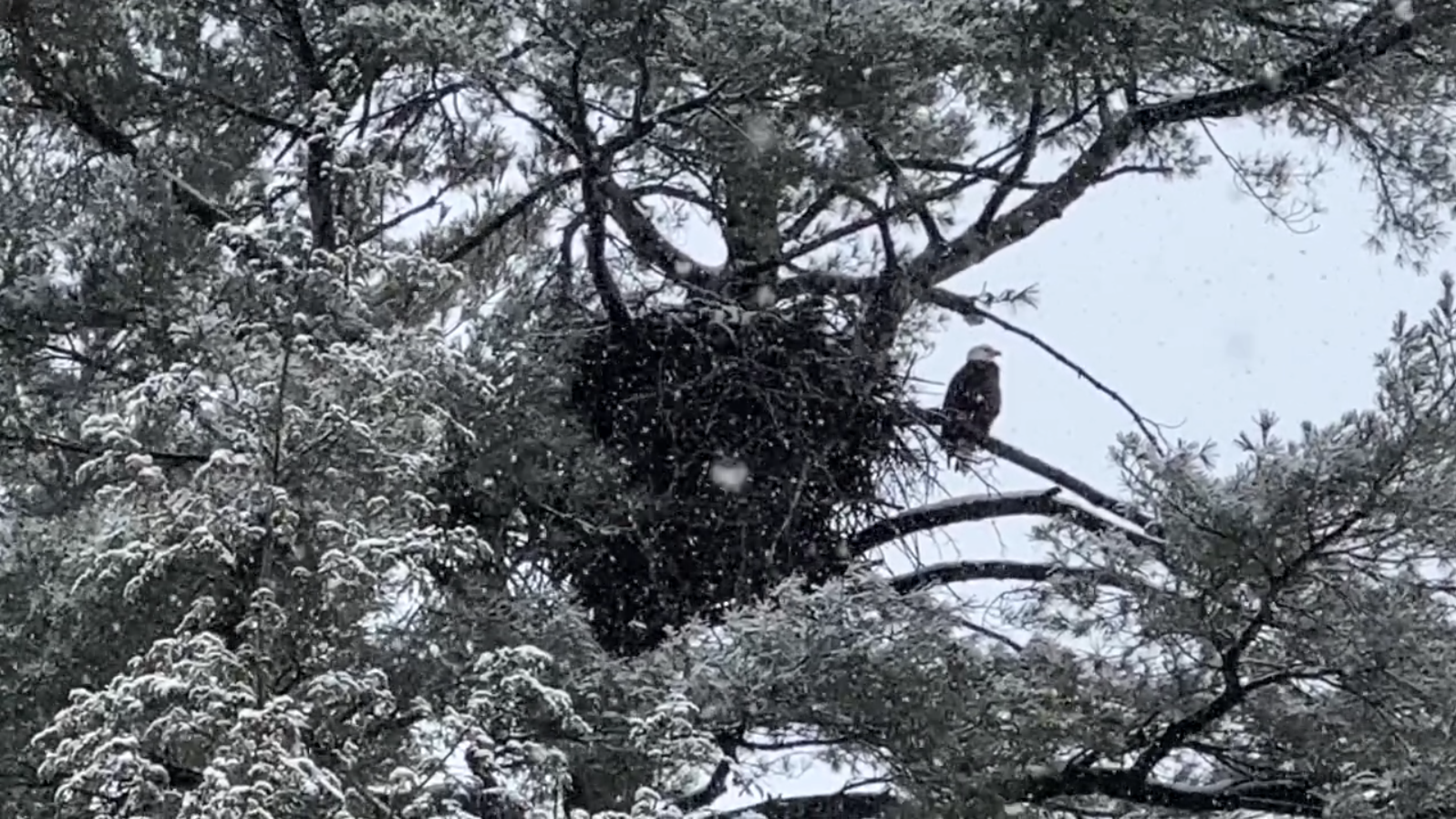
‘Territorial Pair’ Of Loons Observed On Lake St. Catherine
For several weeks in late May, lake resident Dawn Smith had been observing a pair of loons that were frequently active in the same area near her camp. Dawn was able to record activity by one of the loons that looked like nest building.
We sent this video to loon biologist Eric Hanson from the Vermont Center for Ecostudies (VCE), and he confirmed that the loons are performing nesting activity. Eric was here at Lake St. Catherine twice in July of 2022, once at our Libraries Love Lakes event, and then again at our Annual Meeting & Dinner. At the Annual Meeting, Eric gave a fantastic presentation about loons, which was recorded - and you can view that here: LSCA's 2022 Annual Meeting & Dinner. In 2021, Eric also rescued a sub-adult loon on Lake St. Catherine that had been caught up with a lure and fishing line. You can read about that here: https://lakestcatherine.org/blog/12107471
On May 27th, Eric loaded up loon nesting buoys and headed down from Crafstbury Vermont to the lake. We put 5 signs together and headed out to the site.
Although the loons had been performing nesting activity on the site over several days, there was no evidence of a nest yet, so we did not place the signs. So, now that our territorial pair have decided to nest, we'll need to keep an eye out to see if they attempt to nest at the initial site that they were observed at, or somewhere nearby in 2024. Based on this activity, we’ll work with Eric to place nesting platforms in the area to give them the best chance to nest next April after ice out. Thanks to Dawn for storing the signs at her camp!
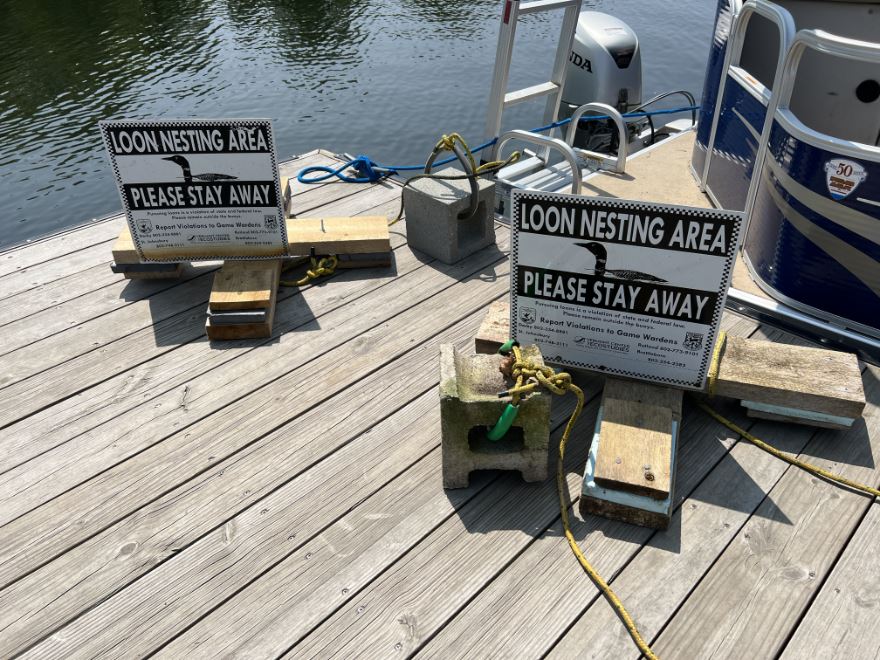
Later in August, in partnership with VCE and Vermont Fish & Wildlife, we installed a collection tube provided by VCE at the boat launch in Wells to collect old lead tackle and monofilament fishing line.
Even a small lead split shot is 100 percent fatal if swallowed.
Every year lead tackle and discarded monofilament line kills aquatic wildlife, including loons, eagles, swans, geese, mammals, and other waterbirds, and nearly 50% of loon deaths from 1989-2022 in Vermont were caused by lead fishing gear, monofilament, and ingestion of hooks.
Our Greeters will inform boaters of the new collection tube, and we will monitor it throughout the year. VCE will make pickups and properly dispose of the collected lead and line.
Check your tackle box for old lead sinkers, tackle, and old fishing line, and drop it off in the tube!
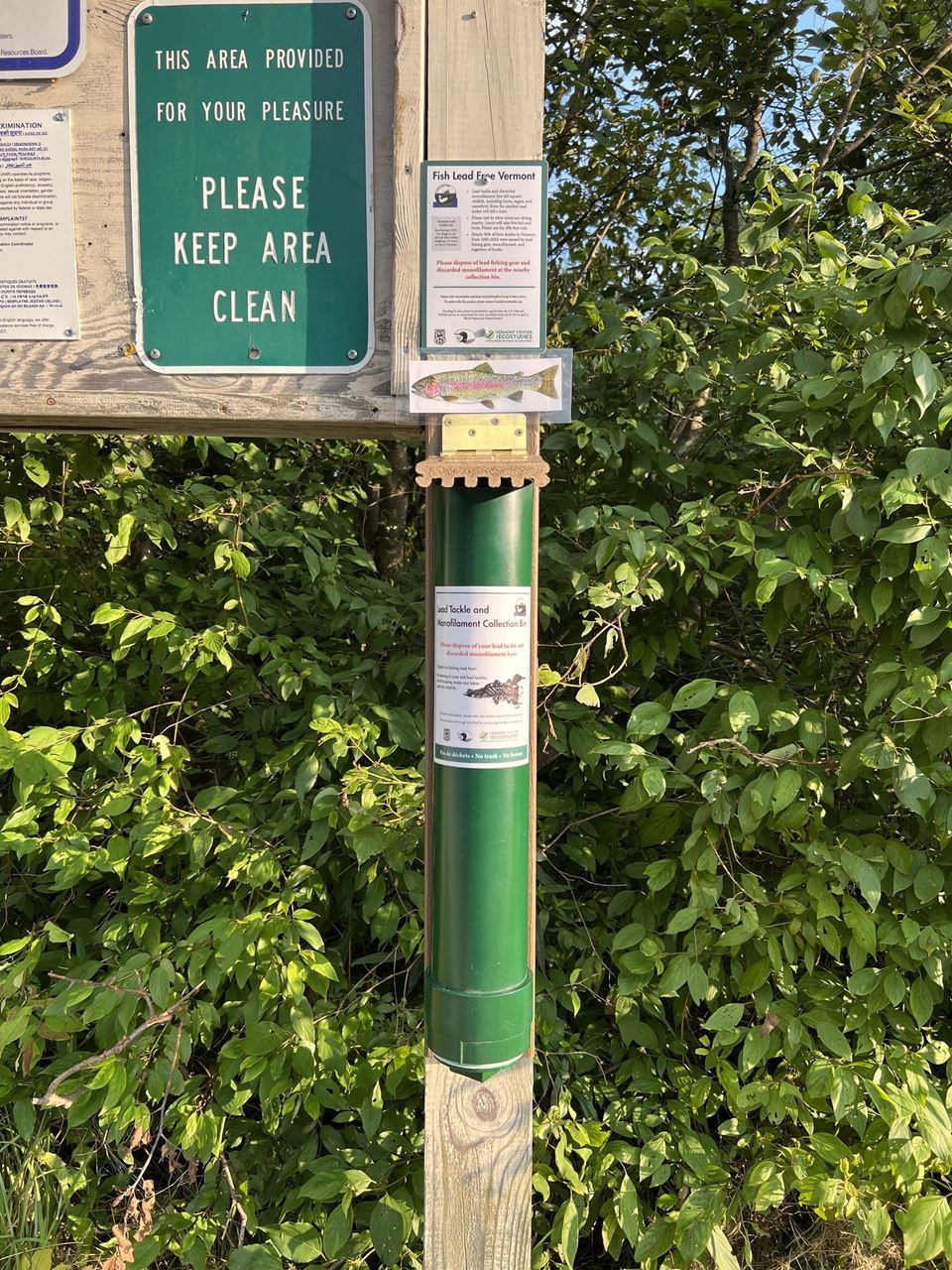
Milfoil Control Control Program
Each season, the LSCA implements a Milfoil Control Program to keep milfoil in check in Lake St. Catherine using a combination of spot herbicide treatments and DASH (Diver Assisted Suction Harvesting).
The LSCA’s Milfoil Control Program consists of four components:
1. ‘Stop The Spread’ education and outreach. Our ‘Stop The Spread’ campaign educates boaters and property owners on best practices to limit the spread of milfoil. Each year, the LSCA holds a lake community meeting to discuss the control plan for the season, answer questions, and hand out a flyer with best practices for lake users to limit the spread of milfoil.
2. Volunteer milfoil cleanup. Throughout the season, we organize volunteers to collect detached floating milfoil from the lake and deposit it on our designated drop off platforms. The milfoil is then picked up from the platforms and disposed of. We also encourage boaters and property owners to remove any milfoil they see in the lake while boating or on their shoreline.
3. DASH - Diver Assisted Suction Harvesting. Our DASH crew suits up in scuba gear and hand-pulls milfoil by the roots from the lakebed. In sections of lower milfoil density, they will swim the area and hand-pull with mesh bags. In higher density areas, they will set up the DASH equipment which allows them to suction the hand-pulled milfoil up through a tube to a catch table on a boat. Milfoil is then placed in 17.5 gallon buckets for transport off the lake.
4. Herbicide spot treatments with ProcellaCOR EC. In order to maximize our DASH crew’s time, effectiveness, and number of acres covered, one of our control methods includes spot treatments with the herbicide ProcellaCOR EC (we did not perform a spot treatment in 2023).
Although not directly related to Milfoil Control, the LSCA's work on Lake Wise on LSC, the LSC Stormwater Master Plan, and the LSC Watershed Action Plan all help to limit phosphorus and other nutrients from entering the lake which can contribute to excessive plant growth, and improves overall water quality.
Our DASH crew started their work early in the summer by swimming and hand-pulling milfoil in less dense areas, and began full DASH operations on July 1st, and worked into September. Over this time, the DASH crew removed 1,057 (17.5 gallon) buckets of milfoil from the lake, covering just over 65 acres in 5 areas of the lake.
These efforts led to another successful year of milfoil control on Lake St. Catherine. Also, and just as importantly, we continue to see many species of our native aquatic plants that have been suppressed by milfoil growth like Water stargrass, Tape grass, Thin-leaf pondweed, Illinois pondweed, Common waterweed, and Robbins’ pondweed have all increased in frequency of occurrence. You can view our Aquatic Vegetation Management Reports dating back to 2001 here.
These results are exactly what we want to see!
Lake St. Catherine has over 30 native aquatic plants which are important and necessary to sustain a healthy lake ecology. Our efforts are focused on reducing the amount of milfoil in the lake so that these native aquatic plants can grow as they normally would. Keeping milfoil under control is helping to return the aquatic plant environment to conditions before milfoil was introduced in the 1970s. Because of our milfoil control efforts, we again have a complex and diverse native aquatic plant community.
In September, our contractor Arrowwood Environmental performed a comprehensive lake-wide aquatic vegetation survey taking place over several days to both evaluate the performance of our milfoil control efforts, and to assess the overall state of aquatic plants in Lake St. Catherine.
Back in 2001, 199 GPS points were plotted throughout Lake St. Catherine, and these points are evaluated for aquatic plants during each report. This is the 20th consecutive year a plant survey has been performed on Lake St. Catherine. You can see all the previous reports, dating back to 2001 in our Links & Downloads section.
The full report can be read here: 2023 - Aquatic Vegetation Management Report. We encourage you to take a few moments to read through the whole report.
In early May, the lake will again be surveyed for milfoil growth. Using the data collected during this survey, and the data from the fall survey, areas that need to be addressed will be identified, and a plan will be created.
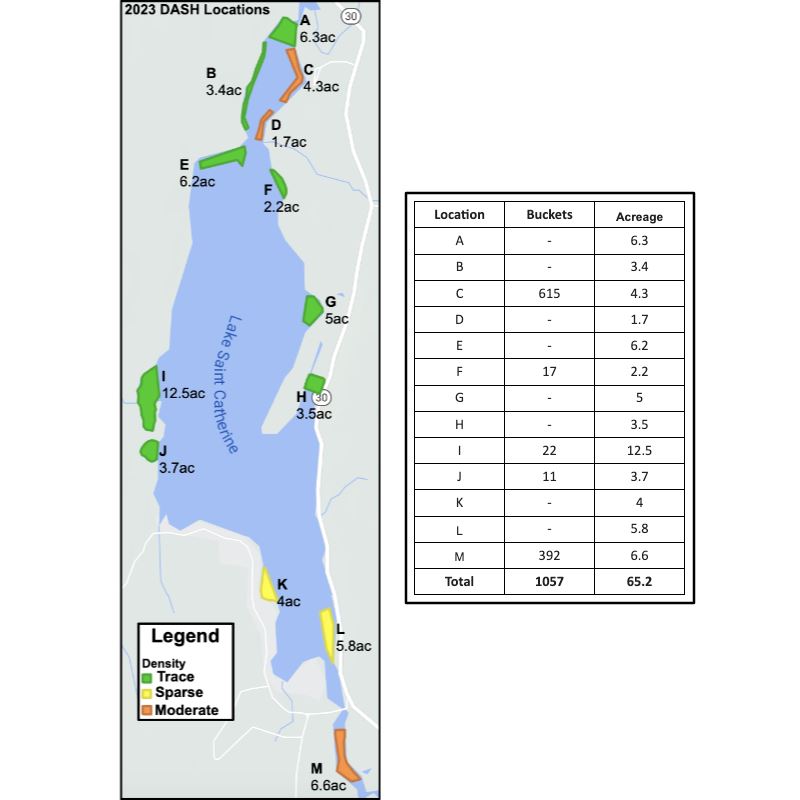
Sponsor Spotlight
We’d like to thank the 16 businesses who were LSCA Business Sponsors in 2022!
Our $200 Business Sponsor membership includes a listing on the Sponsors page of our website, a listing in our spring and fall newsletters, and a Sponsor Spotlight in June on our website and Facebook pages.
Thank you: A-1 Sewer & Drain Service, A113 Productions, Aerus Water and Air Purification, Bird Dog Home Inspection, Catherine Capers, Haun Welding Supply, Lake St. Catherine Cottages, Lake St. Catherine Country Club, Merritt Environmental Consulting, New England Lakeside Realty, North Adams Sheet Metal, Inc., Rathbun's Maple Sugar House, Realty One Group Lakes & Homes, VT Lakehouse, Williams Hardware, Woodard Marine.
We’d also like to give a special thank you to the LSC Country Club for providing a discount to LSCA members by offering 10% discount off daily rates, and cart rentals at membership rates, and to Aerus Water and Air Purification who offered a free arsenic and bacteria test of your water.
If you’d like to become a Business Sponsor in 2024, please let us know!
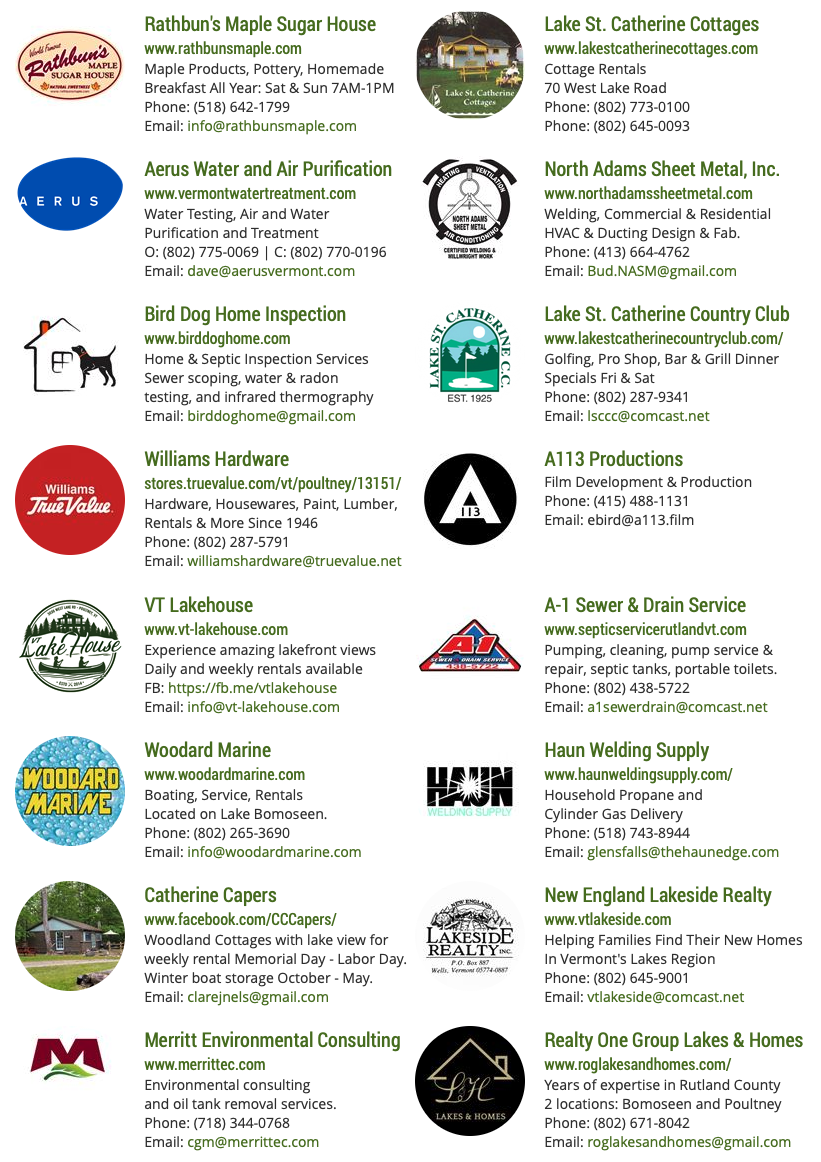
Community Talks & Town to Trails Open House
The LSCA was happy to be asked to participate in the Poultney Comes Together Again: Community Talks & Town to Trails Open House which took place on June 16th at the Poultney High School.
This was a great event! Lots of fantastic ideas for Poultney were shared - and lots of hard working local groups, including the LSCA, gave brief presentations about their work. It was great to see so many folks from the lake in attendance - it was great speaking with everyone.

Boating Safety Classes & Lake Safety
The LSCA was happy to be able to again provide free boating safety classes for those in the lake community who wanted to get their boating license. Anyone born after January 1st, 1974 must successfully complete an approved boating safety education course to legally operate any motorized vessel - including personal watercraft.
Frank Callahan, Trustee in charge of Boating Safety, conducted the 2 free courses - in June. 16 lake community members earned their boating safety education card. We hope to be able to offer these classes again in 2024. Keep an eye out for an announcement in the spring.
The LSCA also places and maintains no-wake zone and marker buoys throughout the lake. In 2023, the Lake Safety Committee deployed multiple new markers to replace the aging ones, and a few more will be replaced in 2024. Thank you to our ‘Buoy Buddies’ around the lake who assist us each year with the spring installation and fall removal of the markers and buoys.
We’d also like to thank our Game Warden Justin Turner who provided the lake community with six updates throughout the season - keeping us informed of Warden activity at the lake. Thanks Justin!
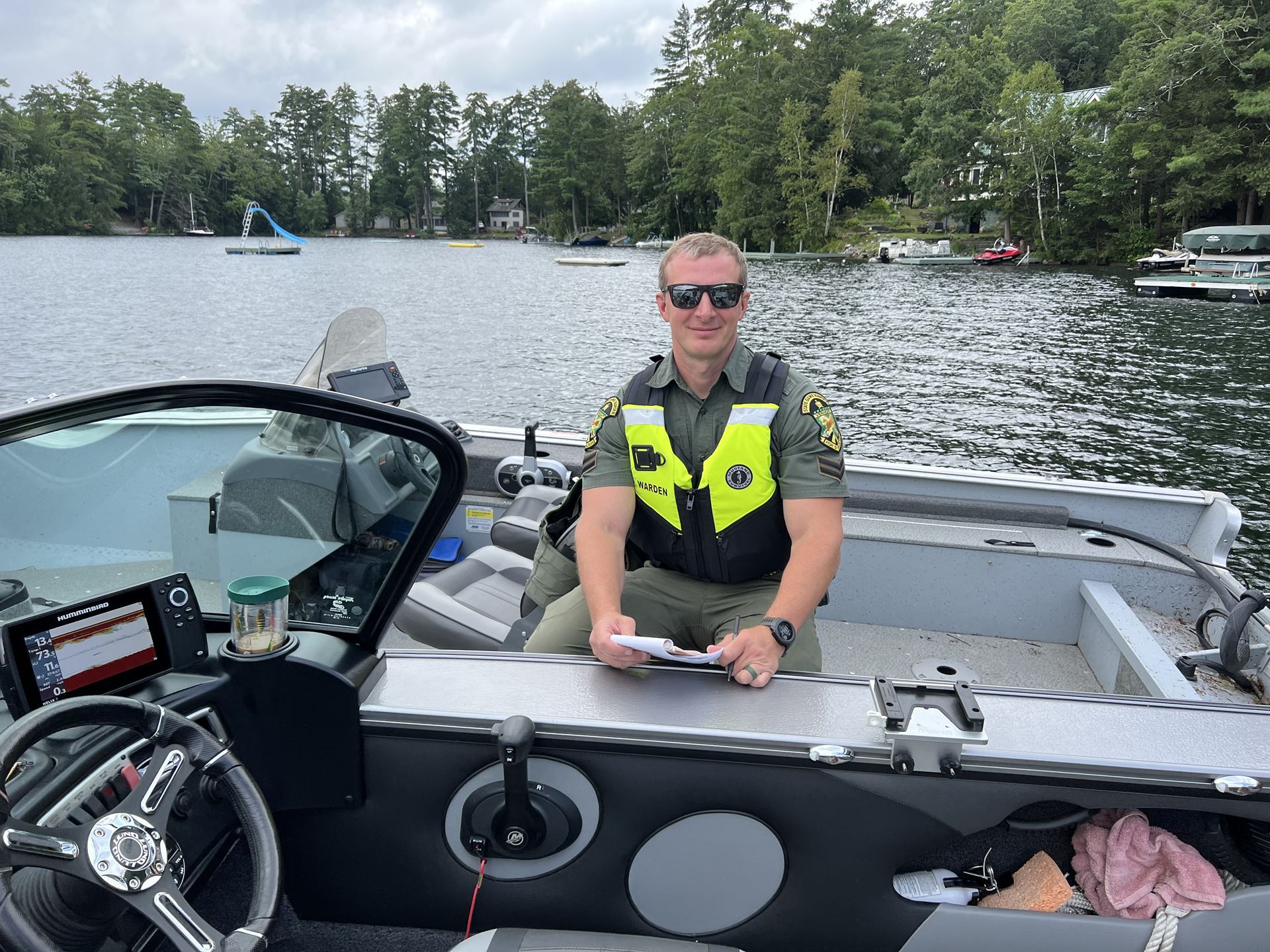
The Lake Wise Program
It was the 5th season for Lake Wise on Lake St. Catherine!
Lake Wise is a program developed by Vermont’s Lakes and Ponds Program to recognize outstanding efforts by homeowners who live along a lakeshore to protect the water quality and habitat along the shoreline and within the near-shore area of the lake.
Stormwater has a widespread environmental impact which makes it a growing concern in Vermont. In a statewide effort, towns and local organizations are working to implement large scale projects to help clean stormwater before it enters water bodies. Work is being done from the headwaters all the way down to the stream outlets. Excess nutrients in the water contribute to problems which affect both human and wildlife health including; lower oxygen levels in the water, toxic algae blooms, and excessive plant growth.
This season, the LSCA again earned a grant from the Lake Champlain Basin Program (LCBP) to perform Lake Wise assessments, and to help property owners with projects on their land to mitigate stormwater runoff into the lake. The LSCA was happy to again partner with the Poultney Mettowee Natural Resources Conservation District (PMNRCD) on this project.
The PMNRCD crew completed a tremendous amount of work in support of the Lake Wise Program this season. They were also able to leverage their Lake Education Action Program (LEAP) program, which pairs student and community lake education with the implementation of small planting projects for shoreline owners to increase the amount of projects completed.
20 properties were assessed (15 new and 5 re-assessments) and 15 Lake Wise projects were implemented (3 additional LEAP projects were also implemented). There were no award winners this season, but numerous properties came very close. With the guidance and assistance of the PMNRCD, these properties, and properties assessed in previous years, will have the opportunity to earn the award in the future.
Thank you to all the participants for the work they have put into their property in an effort to become Lake Wise. This work represents a model of what all LSC lakeshore owners should strive for, as these projects are both beautiful and lake friendly.
In July, at the DEC’s Lake Wise training which occurred at Lake St. Catherine, we learned that since the program's inception in 2014, 780 Lake Wise assessments have been performed, and 81 of those have taken place on Lake St. Catherine! That's over 10% of all the Lake Wise assessments in the State! This is a fantastic testament to the commitment of our lakeshore owners to work to preserve and protect beautiful Lake St. Catherine.
The LSCA would like to help other Lake St. Catherine property owners implement best practices to mitigate stormwater on their properties, and help them to earn the Lake Wise award. Including this season, approximately 100 properties have participated in the Lake Wise Program, and have at least received an initial assessment. If you would like to participate, or have your property reassessed, please email us at info@lakestcatherine.org.
In early December, we learned that we'd earned a grant from the Lake Champlain Basin Program (LCBP) for a Clean Water Small Implementation Grant for $18,952 for the 2024 Lake Wise Program!
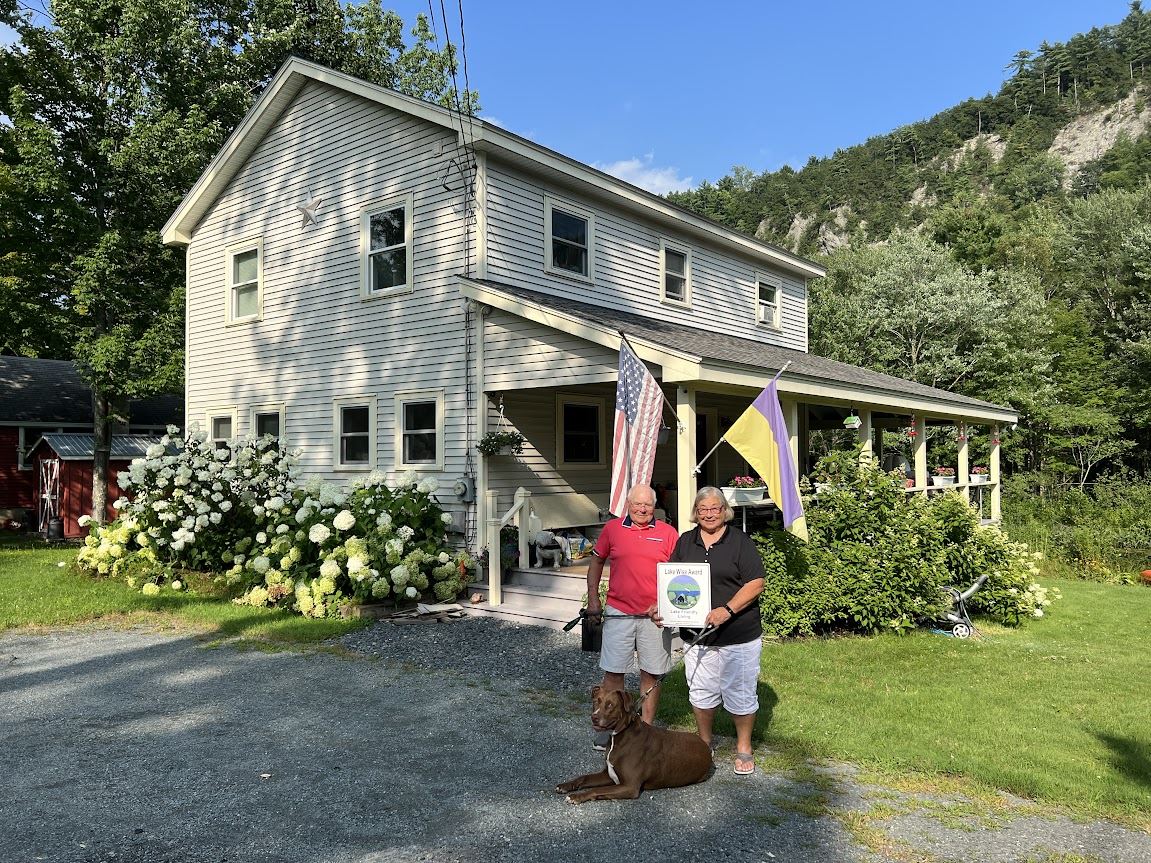
LSCA Receives Generous Land Donation
Back in August of 2021, the LSCA received a letter from someone who wanted to make a land donation to us to help support our mission for Lake St. Catherine. They said: "I am aware of the work the LSCA does in preserving Lake St. Catherine and hope this donation furthers your ability to continue that work."
After all associated costs from the sale of the property have been accounted for, the proceeds from this donation will total just over $42,000 dollars. Two of our trustees donated their professional time to minimize the expenses of LSCA related to this real estate transaction.
This donation will help to fund important water quality improvements like the creation of the Lake St. Catherine Watershed Action Plan, and the projects that will result from it.
In addition, this large supplement to our cash reserve will help LSCA bridge the timing gap that often exists between the expenses incurred to preserve the lake and various municipal grants awarded for this purpose. Sometimes the timing gap is as long as one year.
Please join us in thanking the donor (who wishes to remain anonymous) for this extremely generous donation which will greatly benefit Lake St. Catherine!
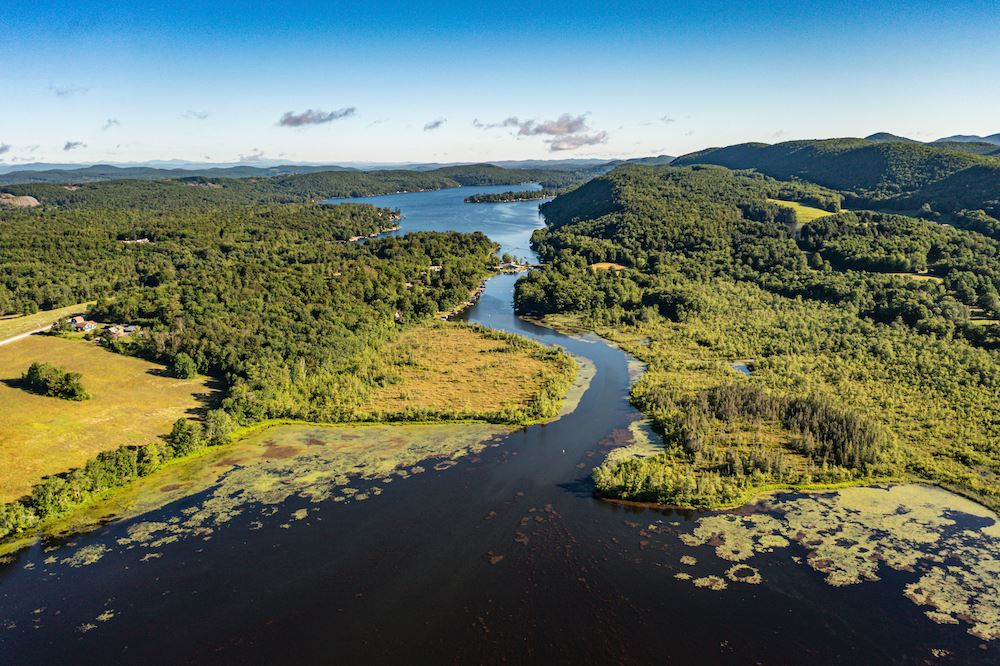
Click here to read Part II.